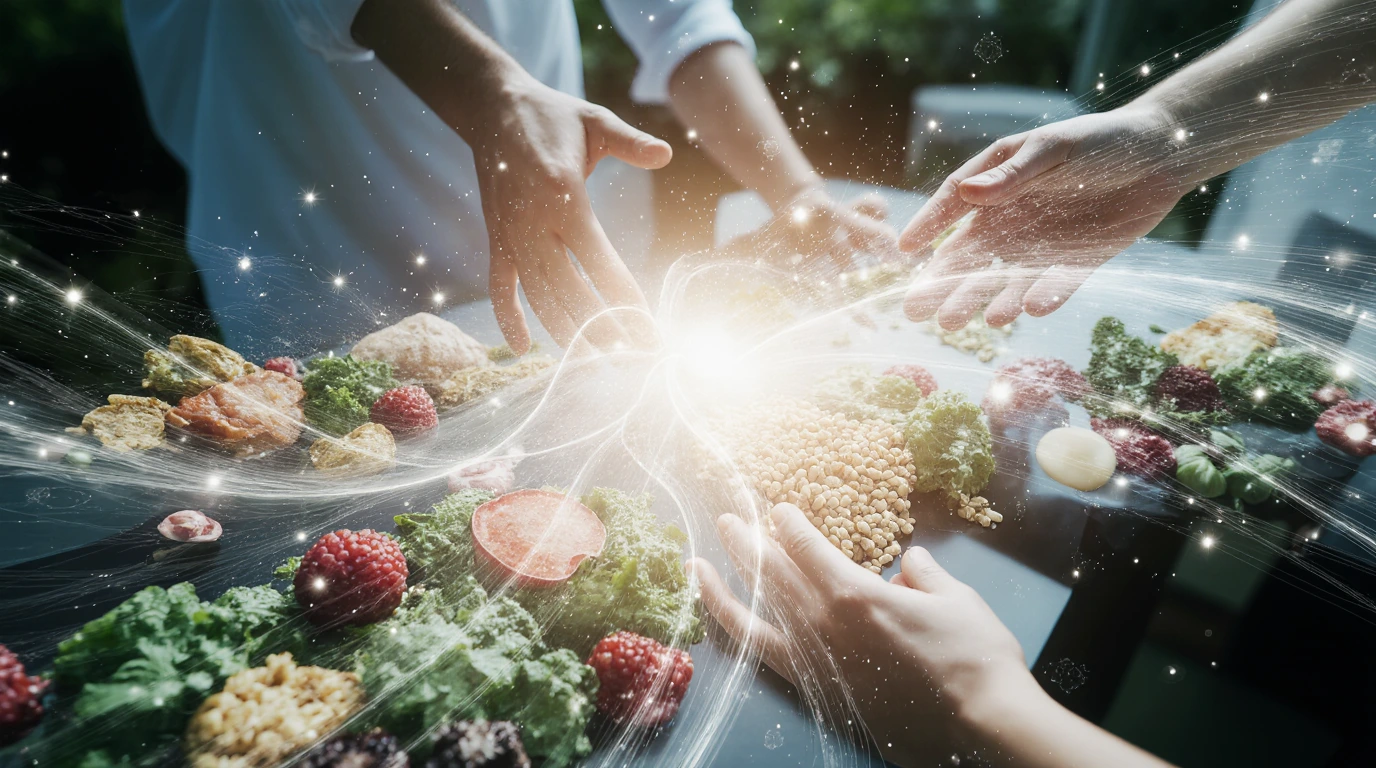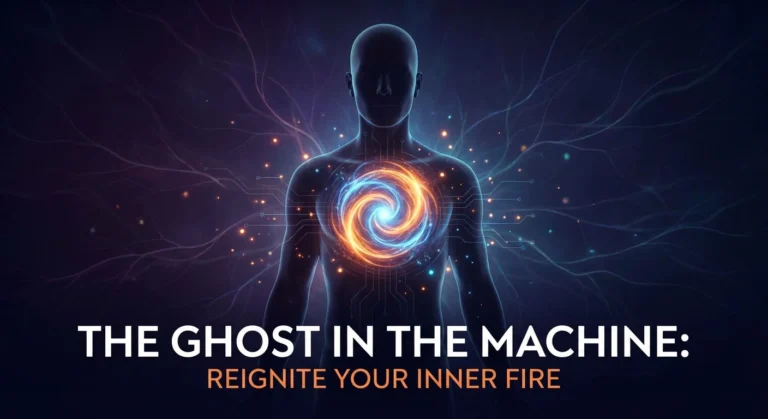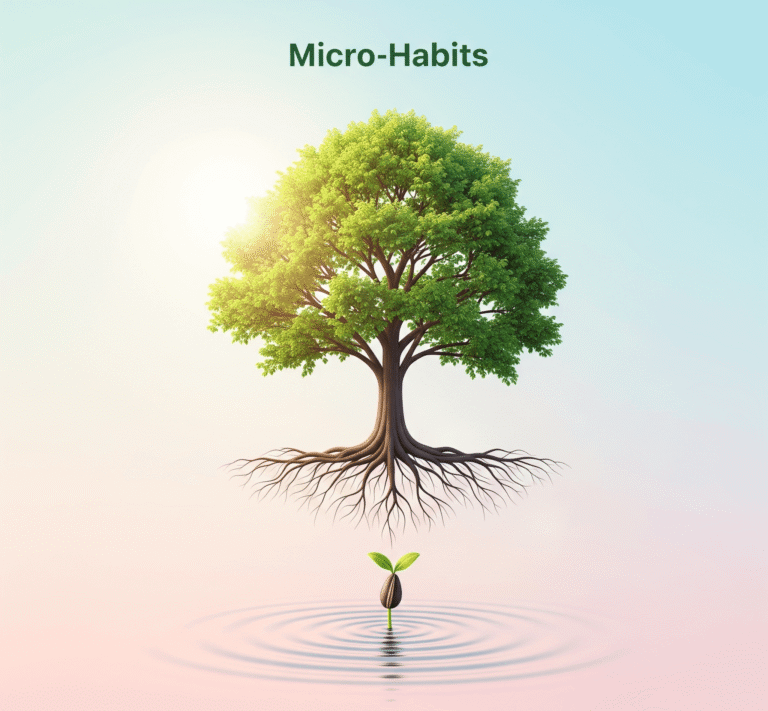Food Is More Than Fuel: Redefining Our Relationship with Nutrition
Food Is More Than Fuel
In the world of fitness and nutrition, a tired old analogy keeps making the rounds: food is fuel, and your body is like a high-performance race car, say, a Ferrari. The idea is simple—eat just enough high-quality “fuel” to keep your engine running smoothly, but not too much, or you’ll “clog” the system and gain weight. It’s a neat metaphor, one that’s been repeated ad nauseam in gym locker rooms, diet books, and social media posts. But here’s the thing: it’s also wildly oversimplified. Food is so much more than just fuel, and your body? It’s not a machine—it’s a living, breathing, dynamic system that defies such a reductive comparison.
This article challenges the “food is fuel” narrative, diving into why it falls short and how it limits our understanding of nutrition. Food isn’t just about calories or energy; it’s a complex interplay of nutrients, signals, and stories that shape our health, culture, and identity. Let’s explore why food deserves a richer narrative—and how you can start crafting your own.
Table of Contents
The Problem with “Food Is Fuel”
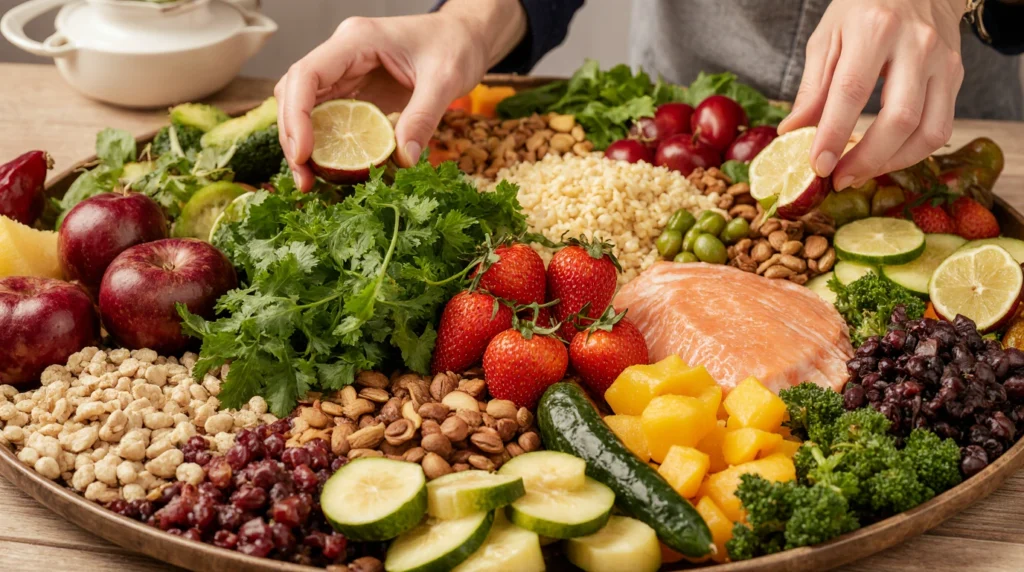
If you’ve spent any time in fitness circles, you’ve likely heard the “food is fuel” mantra. It’s a go-to for trainers, dietitians, and influencers pushing disciplined eating habits. A quick glance at social media confirms its grip: in a recent Facebook poll by Precision Nutrition, a whopping 33% of respondents described food as “fuel.” That’s a third of people reducing their meals to the equivalent of gasoline for their metaphorical Ferrari.
The problem? This analogy flattens food’s role into something one-dimensional. It suggests that food’s only job is to provide energy—calories to burn—and that our bodies are predictable machines that process this fuel with mechanical precision. In reality, food delivers far more than energy. It’s packed with micronutrients, phytochemicals, and zoochemicals that play critical roles in health, none of which fit neatly into the “fuel” box. By focusing solely on calories, we risk ignoring these vital players, leading to nutrient deficiencies and a less vibrant, less healthy life.
Worse, the “Ferrari” comparison implies our bodies operate like combustion engines—input X calories, get Y performance. But human physiology doesn’t work that way. Ever eaten fewer calories and still gained weight? Or cut out breakfast, only to feel sluggish instead of lean? These quirks expose the limits of the fuel metaphor. Our bodies are dynamic, self-regulating systems influenced by countless factors, from gut bacteria to stress levels. Reducing food to fuel ignores this beautiful complexity.
Food as More Than Fuel
Let’s unpack what food really is by looking at its key components: macronutrients, micronutrients, phytochemicals, and zoochemicals. Each plays a unique role, far beyond simply “powering” the body.
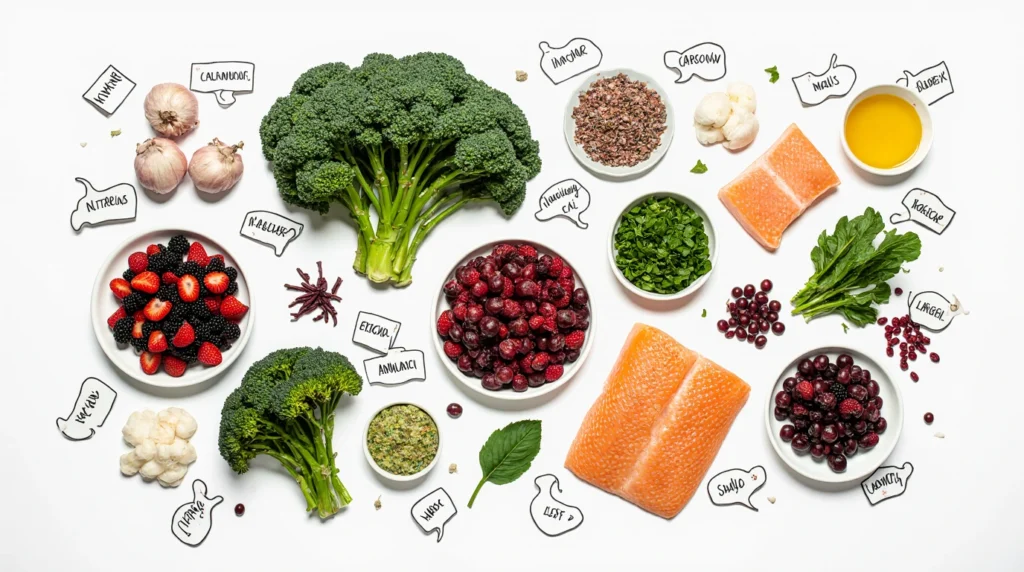
Micronutrients: Vitamins and Minerals
Macronutrients—proteins, carbs, and fats—get all the attention because they provide calories, the supposed “fuel.” But micronutrients, like vitamins and minerals, are the unsung heroes of nutrition. They don’t contribute energy, yet they’re essential for keeping your body running smoothly.
Consider calcium: it builds strong bones, helps blood clot, regulates blood pressure, and keeps your heart and muscles functioning. Magnesium is a workhorse, involved in over 300 enzyme systems, aiding protein synthesis, nerve function, blood sugar control, and energy production. Folate (vitamin B9) supports energy conversion, nervous system health, tissue growth, and red blood cell production. Without these, your body breaks down—no matter how much “fuel” you’re pouring in.
Yet, when we view food as fuel, we often overlook these critical nutrients. The result? Widespread deficiencies. For example, studies show that up to 40% of adults in the U.S. are deficient in magnesium, and 20% lack adequate folate. These gaps lead to fatigue, weakened immunity, and chronic health issues—hardly the performance of a finely tuned Ferrari.
Phytochemicals
Phytochemicals are compounds found in plants (phyto = plant) that offer powerful health benefits. They’re not calories, so the “fuel” story ignores them, but they’re vital for long-term health. Phytochemicals fall into categories like flavonoids, phenolic acids, and stilbenes/lignans, with well-known players like anthocyanins (in berries), isoflavones (in soy), and catechins (in tea).
These compounds do incredible things: they protect DNA from free radicals, reduce cancer risk, lower heart disease rates, and even decrease overall mortality. For example, anthocyanins in red and purple foods like grapes and berries improve vision, reduce inflammation, and protect brain health. Garlic’s sulfides lower LDL cholesterol, while broccoli’s isothiocyanates neutralize free radicals and may fight cancer.
Here’s a quick look at some phytochemicals and their benefits:
| Food | Phytochemical | Possible Benefit |
|---|---|---|
| Soy (beans, tofu, natto) | Isoflavones (genistein, daidzein) | Reduces blood pressure, improves vessel dilation |
| Berries, grapes, purple cabbage | Anthocyanins | Improves vision, reduces inflammation, neuroprotective effects |
| Garlic, onions, leeks | Sulfides, thiols | Decreases LDL cholesterol |
| Broccoli, kale, cauliflower | Isothiocyanates (sulforaphane) | Neutralizes free radicals, protects against cancer, balances hormones |
| Tomatoes, watermelon | Carotenoids (lycopene, beta-carotene) | Neutralizes free radicals, reduces cell damage |
Source: UC Davis Nutrition Fact Sheet
By focusing only on calories, the “food is fuel” mindset sidelines these powerful compounds, leaving us nutritionally shortchanged.
Zoochemicals
Zoochemicals are the animal-based counterparts to phytochemicals, found in foods like meat, fish, and dairy. Like phytochemicals, they don’t provide “fuel” but have profound health effects. For instance, EPA and DHA in fatty fish reduce inflammation, protect against heart disease, and support brain and eye health. Conjugated linoleic acid (CLA) in grass-fed meat and dairy may suppress cancer cell growth and boost lean muscle. Creatine in beef and fish supports muscle, brain, and bone health.
Here’s a snapshot of zoochemicals:
| Food | Zoochemical | Possible Benefit |
|---|---|---|
| Fatty fish (salmon, tuna) | EPA, DHA | Reduces inflammation, protects heart, may lower diabetes/cancer risk |
| Grass-fed meat, dairy | CLA (conjugated linoleic acid) | Suppresses cancer, boosts immunity, reduces body fat |
| Egg yolks | Lutein, zeaxanthin | Protects against macular degeneration, improves eye health |
| Beef, pork, herring | Creatine | Supports muscle, brain, bone health; replenishes cellular energy |
Note: Many zoochemicals are fat-soluble, meaning low-fat diets can limit their intake, potentially reducing these benefits.
The Human Body: Beyond a Machine
The “Ferrari” analogy doesn’t just oversimplify food—it misrepresents our bodies, too. A car is a static machine with predictable inputs and outputs. Humans, on the other hand, are dynamic, self-regulating systems that adapt to countless variables. Calorie math often fails because our bodies don’t process food like a combustion engine. You might eat “too many” calories and get leaner, or cut calories and stall weight loss. Why? Because digestion, absorption, and metabolism are influenced by hormones, stress, sleep, and even your gut microbiome.
Speaking of the microbiome, the trillions of bacteria in your gut play a massive role in how you process food. Each person’s microbiome is unique, like a fingerprint, affecting how nutrients are absorbed and used. This means the same meal can have different effects on different people—hardly the predictable mechanics of a Ferrari. Our bodies are more like a bustling movie set, with countless actors (cells, microbes, hormones) working together in a complex, ever-shifting production.
To illustrate the prevalence of nutrient deficiencies when we prioritize “fuel” over nutrition, consider this graph:
Caption: Common nutrient deficiencies in the U.S. population, highlighting the impact of focusing solely on caloric intake (Data source: CDC National Health and Nutrition Examination Survey).
This graph shows that deficiencies in magnesium (40%), vitamin D (30%), and folate (20%) are widespread, underscoring the need to view food holistically.
Food as Information
If food isn’t just fuel, what is it? One powerful way to reframe it is as information. Every bite you take sends signals to your body, directing it to perform specific tasks. Think of food as a script, and your body as a cast of actors interpreting it.
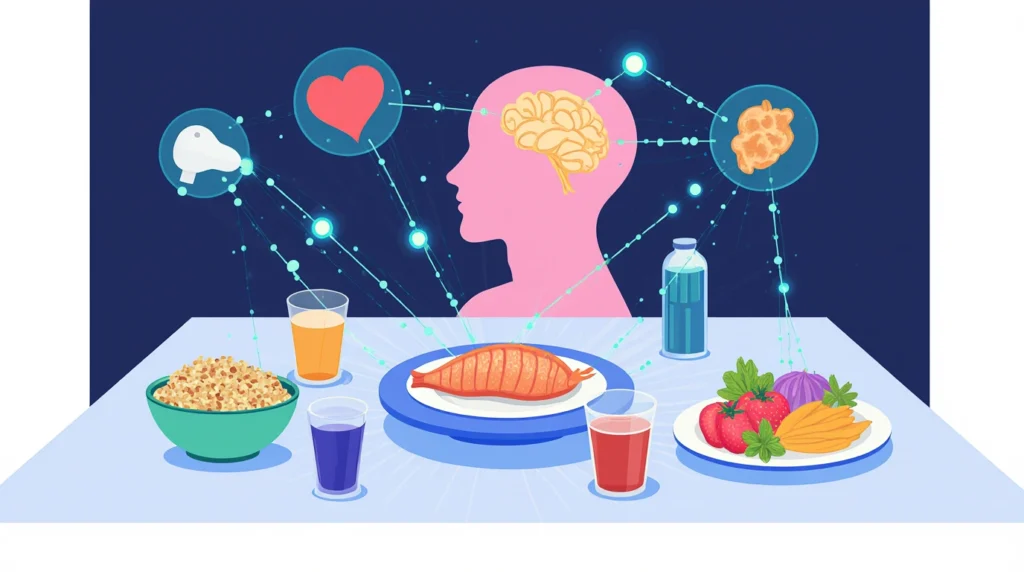
The Carb Story
When you eat carbohydrates—whether it’s a slice of bread or a bowl of fruit—your body breaks them down into glucose, triggering a cascade of signals. Your gut releases molecules like gastric inhibitory polypeptide (GIP) and glucagon-like peptide-1 (GLP-1), which tell your pancreas to produce insulin. Insulin then preps your muscles, brain, and fat cells to absorb glucose. Other hormones, like somatostatin and amylin, signal to your brain that food is incoming, helping regulate appetite. The more consistent these signals, the more your brain registers satisfaction, like clearing an overflowing inbox.
The Protein and Fat Story
Proteins and fats have their own scripts. When digested, they prompt your gut to release cholecystokinin (CCK), which signals your pancreas to produce digestive enzymes and your gallbladder to release bile for fat absorption. CCK also chats with your brain, signaling satiety and even interacting with mood-regulating systems like endocannabinoids. These signals ensure your body not only digests food but also uses it to build muscle, regulate inflammation, and maintain hormonal balance.
The Micronutrient and Chemical Story
Micronutrients, phytochemicals, and zoochemicals add even more layers to this communication. Some boost your body’s antioxidant defenses, others trigger enzymes to fight cancer, and some protect your gut from harmful compounds. Every nutrient is a message, telling your body to grow, repair, protect, or adapt. This intricate dialogue is why food is far more than a caloric input—it’s a symphony of instructions that shapes your health.
Food as a Human Experience
Beyond biology, food is deeply human. It’s how we connect, celebrate, and express who we are. Think about it: sharing a meal is one of humanity’s oldest rituals, from family dinners to cultural feasts. The way we eat tells a story about our identity, values, and relationships.
- Identity: “I’m a foodie who loves exploring new cuisines” or “I’m proud of my Italian heritage, so Sunday pasta is sacred.”
- Caregiving: “I cook for my family because it’s how I show love.”
- Adventure: “I’ll try anything once—last year, I ate fried crickets in Thailand!”
- Values: “I shop at the farmer’s market to support local growers.”
At Precision Nutrition, we believe food is both science and story. Our coaching doesn’t just focus on macros or calories; we help clients explore what food means to them, crafting narratives that align with their health goals and personal values. It’s about moving beyond “filling the tank” to creating a joyful, meaningful relationship with food.

Call to Action
So, what’s your food story? Is food just fuel, a source of guilt, or a path to self-expression? Take a moment to reflect: What do you want food to be? Maybe it’s a tool for vitality, a way to connect with loved ones, or a celebration of your culture. Whatever it is, you have the power to rewrite that story.
At Precision Nutrition, we’ve helped over 150,000 clients transform their health by rethinking their relationship with food. Our coaching method combines cutting-edge science with a deep respect for the human side of eating. We don’t just prescribe meal plans—we guide you to discover what food means to you and how it can support your goals.
Great news: our next Precision Nutrition Coaching program opens today, July 15, 2025! By joining the presale list, you’ll get:
- Instant access to our free ebook, Your Best Nutrition Starts Here: A Complete Guide to Building a Health Plan For Your Body, Goals, and Lifestyle.
- Weekly tips on nutrition, fitness, and lifestyle to jumpstart your journey.
- Early registration (one week before the general public) to secure your spot.
- Up to 54% off the general price for PN Coaching.
Don’t wait—spots fill up fast. Visit Precision Nutrition to join the presale list and start crafting your new food story today.
Conclusion
Food is not just fuel—it’s a complex, dynamic force that nourishes your body, mind, and soul. From the micronutrients that keep your systems humming to the phytochemicals and zoochemicals that protect your health, every bite tells a story. Your body isn’t a Ferrari; it’s a living, adapting masterpiece, responding to the signals food sends. And beyond science, food is a canvas for your identity, culture, and connections.
So, let’s ditch the tired “food is fuel” analogy and embrace a richer narrative. Explore the science of nutrition, celebrate the human experience of eating, and start writing a food story that inspires health, joy, and meaning. With Precision Nutrition, you’re not just eating—you’re creating the healthiest, strongest, most vibrant version of yourself. What’s your food story going to be?

